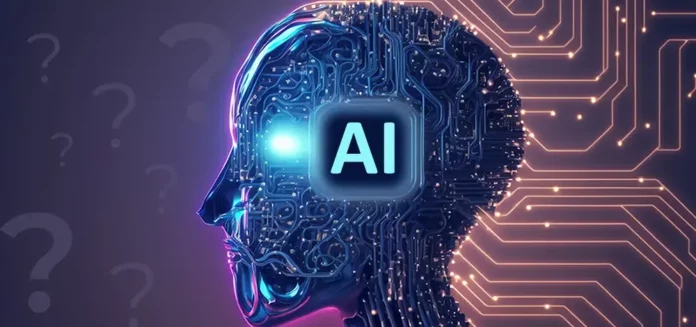Artificial Intelligence (AI) has become an integral part of various industries, transforming the way businesses operate across the globe. From technology and science to health and business marketing, AI is revolutionizing the landscape.
One significant area where AI is exerting its influence is in shaping social media platforms. Marketers now leverage AI to construct entire marketing campaigns, develop compelling copy for social captions, and create advertising slogans.
However, as AI becomes more prevalent, concerns and controversies are emerging, especially regarding platforms like OpenAI’s ChatGPT, where users may not always be aware of AI’s omnipresence in shaping their social media experiences.
Understanding Artificial Intelligence
At its core, Artificial Intelligence refers to the simulation of human intelligence in machines, enabling them to think like humans and mimic their actions. This human-like intelligence allows computers to recognize patterns, and images, perform classification tasks, make decisions, and judge, among other capabilities. In the realm of social media, AI is embedded in various tools and functionalities, aiding marketers in streamlining their daily tasks.
AI in social media takes on several forms, including:
- Chat and Messaging Tools: Automation of chatbot conversations for customer engagement.
- Content Spell-check Tools: Ensuring mistake-free posts and content.
- SEO Tools: Enhancing content ranking in search engines for better visibility.
- E-commerce Tools: Assisting customers in filtering content to find relevant information.
Benefits and Disadvantages of AI in Social Media
Benefits
- Facial Recognition: Enables tagging people in images and filters inappropriate content.
- Increased Security: Prevents data and identity theft, detects and combats spam automatically.
- 24/7 Availability: AI-powered chatbots respond to customer needs promptly, improving user experience.
- Recommendation Engines: Helps users discover content, products, and accounts based on preferences.
- Sentiment Analysis: Understands audience needs, identifies trends, and highlights business opportunities.
- Revenue Acceleration: Customizes brand strategy using historical data for effective social media advertising.
- Cost Reduction: Enhances efficiency, reducing operational and marketing costs through task automation.
- Content Testing and Optimization: Assists in ensuring marketing strategies reach their full potential.
Disadvantages
- Quality Concerns: Struggles with gray-zoned content, focusing on more straightforward information.
- Possible Plagiarism: Content may be pieced together from various sources, leading to reworded existing content.
- Content Devaluation: Algorithms may devalue AI-created content focused on ranking higher in search engines.
- Emotionless and Lack of Understanding: Focuses on keywords without truly comprehending the emotional nuances of the text.
- Misinterpretation of Content: Human editing is still required for quality checks in most AI tasks.
- Lack of Creativity: Unable to generate entirely new and fresh ideas, relying on existing data.
How AI Is Used in Social Media
Digital marketers employ AI as a guiding tool across various aspects of social media management:
1. Content Creation and Curation
AI analyzes user data, preferences, and behavior to guide marketers in creating content tailored to specific audiences. It streamlines the content creation process, providing insights into what resonates with different segments.
2. Personalization
AI helps marketers understand buying behavior, offering the ability to create more personalized and engaging content. Algorithms, deep learning, and data sets enable AI to learn from user habits and make recommendations efficiently.
3. Social Listening
AI algorithms scour social media for valuable data sets, labeling and categorizing them for marketing purposes. This data is then leveraged to create unique, targeted content that appeals to specific customer segments.
4. Optimization of Paid Media
AI assists in optimizing social media strategy investments by refining content targeting. It aids in content scheduling, posting across platforms, and ensures high efficiency while freeing up marketing teams for more strategic tasks.
5. Improved Response Time
Social media marketers utilizing AI can categorize and filter comments and messages, responding quickly and efficiently. This enhances the overall user experience by making customer journeys hassle-free.
6. Automation
AI-driven conversational systems, such as chatbots, mimic real-time communication, providing 24/7 customer service. Automation proves to be a cost-effective way to strengthen brand image and offer quality customer support.
Also, check out more ways to leverage AI for social media and implement a proper strategy in your business.
Leading social media platforms have embraced AI to enhance user experience and streamline content management:
1. Facebook
Facebook utilizes AI-powered tools to suggest friends and content based on user choices and preferences. AI assists in identifying visuals, recommending tag options, and recognizing faces in photos.
2. Twitter
Twitter employs AI to categorize tweets, prioritize content, suggest replies, and detect fraudulent propaganda. Neural network intelligence is used for photo cropping, maximizing aesthetic appeal.
3. Snapchat
Snapchat uses AI-powered lenses to detect faces and features, optimizing filter applications. AI aids in targeting ads efficiently and provides valuable insights into trending topics for marketers and influencers.
4. Instagram
AI on Instagram customizes content for the Explore tab based on user behavior and interaction data. It significantly enhances user engagement and experience.
5. TikTok
TikTok relies on AI-based recommendation algorithms for extreme user engagement. AI tracks user behavior, maps personalities, and highlights emotion patterns to suggest content that aligns with users’ interests.
The Role of AI in Social Media Content Creation
AI has become a “force multiplier for creative expression,” as noted by Ogilvy’s Creative Director, David Raichman. AI tools have proven invaluable in overcoming creative blocks, providing inspiration, and enhancing content production.
How to Save Time in Social Media Content Creation with AI
Whether you are a content creator, marketer, or business owner, the pressure to deliver engaging social media content consistently can be overwhelming. AI content creation tools come to the rescue by leveraging technologies such as Natural Language Processing (NLP) to assist in creating, optimizing, and managing content for various social media platforms.
Conclusion
Artificial Intelligence is reshaping social media across various dimensions, from content creation and personalization to social listening and competitor analysis. The benefits of AI in social media are substantial, improving efficiency, user experience, and the overall effectiveness of marketing strategies.
However, challenges and concerns persist, particularly regarding the quality and creativity limitations of AI-generated content. As technology continues to advance, the role of AI in social media will undoubtedly evolve, offering new possibilities and solutions for businesses and marketers worldwide. The key lies in understanding how to harness the power of AI responsibly and effectively to enhance rather than replace human creativity and ingenuity.







